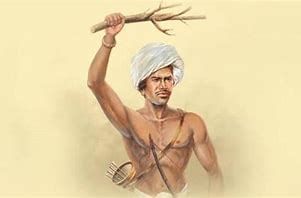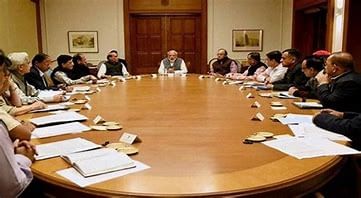UPSC Daily Current Affairs - 10th June 2024 | Current Affairs & Hindu Analysis: Daily, Weekly & Monthly PDF Download
GS-I/History and Culture
124th Death Anniversary of Birsa Munda
Source: Indian Express

Why in News?
Jharkhand CM marked the 124th death anniversary of revolutionary tribal leader “Birsa Munda” by paying his tributes.
Who was Birsa Munda (1875-1900)?
- Born November 15, 1875, Birsa Munda was a leader of the Munda community in the Chotanagpur region of Jharkhand during British rule.
- Educated by Jaipal Nag and inspired by the Sardari agitation, he became a prominent advocate for tribal rights.
Causes of the Rebellion
- Impact of Colonial Policies: British policies like the Permanent Settlement Act disrupted traditional land ownership, leading to tribal displacement and exploitation.
- Erosion of Khuntkattidar System: Traditional land rights were undermined by jagirdars and thikadars, resulting in land alienation.
- Land Alienation and Exploitation: Non-tribal migration increased under British rule, exploiting tribals through high-interest money lending and forced labor.
- Missionary Activity: Missionary education raised tribal awareness, sparking movements for tribal reconstruction.
Major Activities
- New Faith 'Birsait' against Religious Conversion: Birsa initiated the Birsait faith to counter British conversion efforts, gaining support among the Munda and Oraon communities.
- The Birsa Movement: Ulgulan: Birsa led the Munda Rebellion in 1899-1900, seeking Munda Raj and independence in Khunti, Tamar, Sarwada, and Bandgaon.
Significant Outcomes
- Impact: Birsa Munda's mobilization led to government reforms such as the repeal of the Begar system and the enactment of the Tenancy Act (1903).
- His Death: The rebellion was suppressed by British forces, resulting in Birsa Munda's death in jail on June 9, 1900.
GS-II/Governance
IRDAI’s new health insurance rules
Source: The Mint

Why in News?
Recently, the Insurance Regulatory and Development Authority (IRDAI) introduced a set of reforms in the health insurance sector aimed at significantly enhancing service standards for policyholders.
- Cashless Processing: Insurers must accept or reject cashless claims within one hour and settle claims upon discharge within three hours, or bear additional costs for delays.
- Claim Settlement: Claims cannot be repudiated without approval from the insurer's claims review panel. Documents must be collected from hospitals or third-party administrators, not from the insured.
- Multiple Health Policies: Policyholders with multiple health policies can choose the policy for claim submission, with the primary insurer coordinating settlement with other insurers.
- Reward for No Claims: Policyholders with no claims may receive increased sum insured or discounted premiums.
- Renewal Policies: Individual health policies are renewable without fresh underwriting unless there's a sum insured increase, fraud, non-disclosures, or misrepresentation.
- Portability Requests: Stricter timelines are imposed on portability requests via the Insurance Information Bureau of India portal.
- Customer Information Sheet: Insurers must include a customer information sheet in the policy document explaining policy details comprehensively.
Challenges in Indian Health Insurance
- Opaque Policy Details: Understanding insurance contracts is challenging, leading to uncertainty about coverage and reimbursement.
- Claim Rejections: Inadequate documentation and ambiguous processes often result in claim rejections.
- Claim Settlement Delays: Lengthy claim processing times cause inconvenience and financial stress.
IRDAI and Composition
- IRDAI, constituted under the Insurance Regulatory and Development Authority Act, 1999, regulates the insurance sector in India.
- The composition typically includes a Chairman and members appointed by the Government of India.
- It oversees licensing, pricing, and policyholder protection to ensure industry stability and growth while safeguarding policyholder interests.
Conclusion
- IRDAI's recent health insurance reforms aim to enhance service standards through timely cashless processing, transparent claim settlement, and rewards for no claims.
- These changes address challenges like opaque policies and claim rejections, fostering customer trust.
- IRDAI's role is crucial in ensuring fairness and efficiency in the insurance sector.
GS-II/International Relations
Settling trade disputes through ‘litigotiation’
Source: The Hindu

Why in News?
In March, India and the U.S. settled their last lingering WTO poultry dispute, marking the end of seven trade disputes resolved since Prime Minister Modi’s U.S. visit.
Trade Dispute between India and USA at the WTO
- Indian Scenario: India banned the import of certain agricultural products from the US due to concerns about Avian Influenza (bird flu).
- U.S. Argument: The US challenged India's import restrictions, claiming they deviated from internationally recognized standards set by the World Organization for Animal Health (OIE) and lacked scientific justification, violating the WTO's Sanitary and Phytosanitary (SPS) Agreement.
- Dispute Initiation: The US initiated the dispute in 2012, remaining unresolved for over a decade, becoming the oldest of the seven trade disputes between India and the US.
- Settlement: In 2015, India lost the dispute but settled recently to avoid a yearly $450 million claim. India agreed to reduce tariffs on select US products like cranberries, blueberries, frozen turkey, and premium frozen duck meat.
Standards set by the World Organization for Animal Health (OIE)
- Terrestrial Animal Health Code: First published in 1968, it provides standards for improving terrestrial animal health, welfare, and veterinary public health worldwide.
- Aquatic Animal Health Code: Introduced in 1995, it sets standards for improving aquatic animal health and welfare globally. It ensures the safety of international trade in aquatic animals and products.
Conclusion
The India-US settlement highlights the effectiveness of diplomatic negotiations in resolving trade disputes, enhancing bilateral ties, and promoting a stable international trade environment.
GS-II/Polity and Governance
Is it time for proportional representation?
Source: The Hindu

Why in News?
India should contemplate proportional representation to ensure fairer political outcomes, given NDA’s 293 seats (43.3%) compared to INDIA bloc’s 234 seats (41.6%).
First Past the Post (FPTP) System
- Simple method where the candidate with the most votes in each constituency wins.
- Provides stability to the executive by allowing ruling parties to enjoy a majority in the legislature.
- Criticized for potentially resulting in disproportionate representation and wasted votes.
Proportional Representation (PR) System
- Ensures representation of all parties based on their vote share.
- Implemented through party list PR, where voters vote for parties instead of individual candidates.
- Commonly used in federal countries like India at the state/UT level.
Comparison of Pros and Cons
- FPTP: Simple, stable governments, but may lead to disproportionate representation.
- PR: Fairer representation, inclusivity of smaller parties, but complex and weaker direct constituency representation.
International Practices
- PR system used in various countries like South Africa, the Netherlands, Belgium, and Spain.
- Mixed Member Proportional Representation (MMPR) system employed in Germany and New Zealand.
Mixed Member Proportional Representation (MMPR) System
- Hybrid system combining elements of FPTP and PR to ensure both local representation and proportionality.
- Used in Germany and New Zealand, allocating seats through both constituency elections and proportional representation.
Way Forward
- Proposed experimental introduction of MMPR system in India, recommended by the Law Commission.
- Incremental implementation suggested, potentially allocating 25% of seats in the Lok Sabha using PR.
- Incremental implementation during delimitation exercises to address population disparities while ensuring fair representation.
GS-II/Polity and Governance
Cabinet Committee on Security (CCS)
Source: Indian Express

Why in News?
Prime Minister Modi took oath today along with 71 ministers of the new coalition government. Thirty of them are Cabinet Ministers, five independent charge, and 36 Ministers of State.
Cabinet Committee on Security (CCS):
- Head: Prime Minister.
- Members: Ministers of Defence, Home Affairs, Finance, and External Affairs.
- Functions:
- Deals with defence and security issues.
- Addresses law and order and national security matters.
- Discusses initiatives to enhance national security.
- Handles foreign policy matters with security implications.
- Addresses political issues impacting national security.
Cabinet Committees:
- Nature: Extra-constitutional bodies not mentioned in the Indian Constitution.
- Purpose:
- Reduce the burden on the Union Cabinet by allowing smaller groups of ministers to make decisions on specific policy areas.
- Formation:
- Constituted or reconstituted when a new government takes over or the Cabinet undergoes a reshuffle.
- Types:
- Cabinet Committee on Economic Affairs.
- Cabinet Committee on Political Affairs.
- Cabinet Committee on Investment and Growth.
- Cabinet Committee on Security.
- Cabinet Committee on Parliamentary Affairs.
- Cabinet Committee on Employment and Skill Development.
- Cabinet Committee on Accommodation.
- Appointments Committee of the Cabinet.
These committees serve various purposes and cater to specific policy areas, enabling efficient decision-making within the government.
GS-III/Science and Technology
Quantum Data
Source: Live Science

Why in News?
A new quantum computing study claims that a recent finding in the production, storage and retrieval of "quantum data" has brought us one step closer to the quantum internet.
Quantum data refers to information stored and processed using quantum mechanics principles, represented by quantum bits or qubits instead of classical binary states. Qubits can exist in multiple states simultaneously and be entangled with each other, allowing for unprecedented computational capabilities. Here are some key points about quantum data and its applications:
- Definition: Information stored and processed using principles of quantum mechanics.
- Representation: Quantum bits (qubits) replace classical binary states (0s and 1s).
- Properties:
- Superposition: Qubits can exist in multiple states simultaneously.
- Entanglement: Qubits can be entangled, enabling interconnectedness and correlation.
- Applications:
- Cryptography: Quantum key distribution (QKD) ensures secure communication channels.
- Optimization Problems: Quantum algorithms offer potential efficiency in solving complex optimization problems.
- Simulating Quantum Systems: Quantum computers simulate other quantum systems, aiding in chemistry, materials science, and fundamental physics.
- Machine Learning: Quantum machine learning algorithms could handle large datasets and complex models efficiently.
Quantum data holds promise for revolutionizing various fields due to its unique properties and potential applications in cryptography, optimization, simulation, and machine learning.
GS-I/Geography
Cascadia Subduction Zone
Source: Business Insider

Why in News?
Cascadia Subduction Zone, one of Earth's top hazards, comes into sharper focus.
The Cascadia Subduction Zone (CSZ) is a significant geological feature off the west coast of North America, extending from northern California to southern British Columbia. Here are key points about it:
- Location: Located off the west coast of North America, spanning from northern California to southern British Columbia.
- Geological Feature: Active convergent boundary where the Juan de Fuca Plate is subducting beneath the North American Plate.
- Seismic Activity Implications: Subduction process in the CSZ has significant implications for seismic activity in the region.
- Earthquake and Tsunami Risks:
- Magnitude: Capable of producing massive earthquakes, including those with magnitudes of 9.0 or greater.
- Tsunamis: These earthquakes can generate tsunamis reaching heights of 100 feet or more.
- Comparative Risk: Similar faults, like the one off Japan, triggered devastating events, such as the 2011 Fukushima nuclear disaster.
The CSZ poses significant earthquake and tsunami risks to the region, with the potential for catastrophic events due to its geological characteristics.
GS-II/Polity and Governance
Operation Bluestar
Source: First Post
Why in News?
Slogans favouring Khalistan (sovereign state for Sikhs) were raised recently in the premises of the Golden Temple complex in Punjab’s Amritsar during the 40th anniversary of ‘Operation Bluestar’.
About Operation Bluestar:
- It was an Indian military operation in June 1984 ordered by Prime Minister Indira Gandhi to root out a group of militant Sikh separatists who had occupied the Golden Temple in Punjab’s Amritsar, the Sikhs’ holiest shrine.
- The leader of the group was Jarnail Singh Bhindranwale, a Sikh fundamentalist, former head of the Sikh seminary Damdami Taksal, and a key figure in the then-emerging separatist Khalistan movement.
- The military operation was planned to regain control of the complex while minimizing civilian casualties.
- Timeline of the operation:
- June 1-3, 1984: The operation began on June 1, 1984, with the deployment of Indian Army troops around the Golden Temple complex. Bhindranwale and his followers fiercely resisted the army's advance, leading to intense gun battles.
- June 3-6, 1984: The Indian Army intensified its assault on the complex, using heavy artillery, tanks, and helicopters. The fighting resulted in extensive damage to the Akal Takht, the highest temporal seat of Sikh authority, as well as other parts of the Golden Temple.
- June 6, 1984: The operation officially concluded on June 6, 1984, when the Indian Army gained control of the Golden Temple complex.
- While the army was successful in achieving its goals, some Sikhs were outraged as they saw the operation as an attack on their faith.
- According to the Indian government, about 400 people were killed, including 87 soldiers.
- Operation Blue Star led to the assassination of Prime Minister Indira Gandhi, who was killed by her Sikh bodyguards in revenge five months after the operation.
|
55 videos|5389 docs|1141 tests
|
FAQs on UPSC Daily Current Affairs - 10th June 2024 - Current Affairs & Hindu Analysis: Daily, Weekly & Monthly
| 1. What are the key highlights of IRDAI’s new health insurance rules? |  |
| 2. What is 'litigotiation' and how can it be used to settle trade disputes? |  |
| 3. Why is there a discussion about proportional representation at this time? |  |
| 4. What is the significance of the Cabinet Committee on Security (CCS)? |  |
| 5. How does the Cascadia Subduction Zone pose a threat and what measures are being taken to mitigate the risk? |  |

















